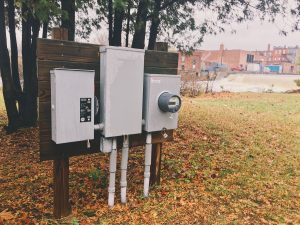Why Ground Testing Is Essential
Regular Ground Testing Is Essential for Electrical Safety
Ground testing is important for the overall electrical safety of your facility and your people. There are actually two types of ground testing that should be performed. But before we get into those, let’s go over grounding, bonding, and why they matter.
What are Grounding and Bonding?
Electrical grounding is the process of connecting electrical equipment to the earth. The reason for this is to create a path for electricity to travel when there are surges, lightning strikes, accidental contact, or static charges. When one of those events occurs, the grounded equipment allows for those discharges to flow into the earth instead of equipment, circuitry, or even worse, people.
Electrical bonding is what connects conductive components, creating the path for electricity to travel. Bonding and grounding work together and need a secure connection to properly function.
So now that you know the basic role of grounding and bonding, let’s look at the two types of ground testing that should be performed.
Two Types of Ground Testing
The first type of ground testing that should be done happens during the actual construction of your facility. This ensures a proper installation. The second is a routine follow-up to ensure your grounding system continues to operate as designed. Think of it as a preventative “check-up” that should be done once a year by a professional electrician.
When ground system testing occurs, it’s a measurement of the resistance between a ground connection and the earth. The correct equipment and methods must be used to gather the correct data. Yet another reason why it’s best to leave the ground testing to a professional electrician.
How can a Ground System Fail?
There are a few reasons why grounding or bonding failures occur. One of them is time. Bonds and connections can loosen over time. Corrosion can happen, which damages connectors and ground rods. This can even happen beneath the ground surface by way of chemicals that have seeped into the ground.
Another example of how a ground system can fail is through the materials used or improper installation. If the wrong materials were used, a connection could eventually fail even though it was working properly after the initial installation. And if the system wasn’t properly installed, to begin with, there could be problems down the road.
Proper professional testing will give you peace of mind, not to mention security knowing you have one less thing to worry about when it comes to losing equipment, data, or even lives. If you’d like to read more about grounding and bonding, click here for info from the National Fire Protection Association.
At E. Stanek Electric, we like to have all the “what if’s” covered when it comes to installing and maintaining the electrical system of your business. We never want you to worry about the things you shouldn’t have to worry about in your day-to-day operations. For new builds, upgrades, or even testing, E. Stanek Electric is here for you. Our trained and certified electricians can help your business just like we’ve done for generations in the La Crosse, Wisconsin area. Questions? Feel free to connect with us or call us at 1-608-782-0433.








